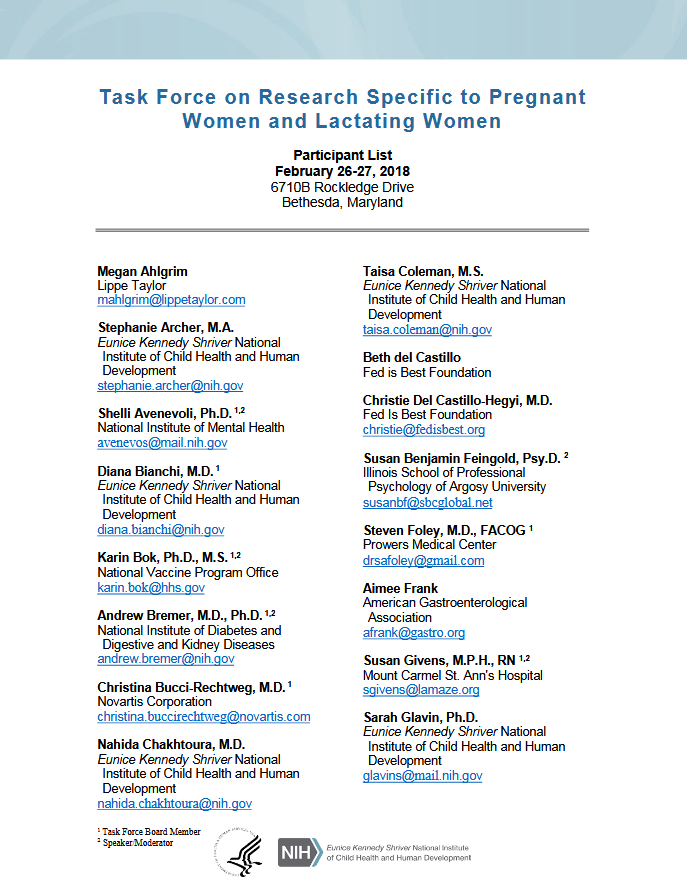Bethesda, MD—On February 26, 2018, Dr. Christie del Castillo-Hegyi, Co-Founder of the Fed is Best Foundation traveled to the NIH to raise awareness on the gaps in breastfeeding protocols, research and education that is leading to common and serious complications in exclusively breastfed newborns.
PRGLAC Participant List, February 26-27, 2018
The full comments submitted to the committee are provided below:
My name is Dr. Christie del Castillo-Hegyi, I am an emergency physician and one of the Co-Founders of the Fed is Best Foundation, a non-profit organization of health professionals and parents whose mission is to research and advocate for safe breastfeeding practices to prevent the complications of infant dehydration, jaundice and hypoglycemia, all known causes of brain injury and permanent disability. I have come here representing thousands of families and health professionals to raise awareness on the complications that exclusively breastfed newborns are exposed to in health facilities all around the country.
Jaundice and dehydration, also known as starvation jaundice, are among the leading causes of newborn hospitalization in the U.S. and across the globe. The leading risk factor for starvation jaundice is exclusive breastfeeding in the first days of life before full breast milk production. This primarily results from insufficient breast milk supply and secondly, from ineffective latch. According to the Academy of Breastfeeding Medicine, starvation jaundice occurs to 10-18% of exclusively breastfed newborns in the first month. Starvation jaundice can result in brain injury that leads to attention deficits as well as impaired motor, sensory, language, behavioral and cognitive development and even frank global disability.
Starvation jaundice can be accompanied by hypoglycemia, dehydration and hypernatremia, each of which can cause mild to severe brain injury, and rarely, death within the first days of life. Research has shown that 10% of healthy, term exclusively breastfed newborns and 23% of first-born newborns develop deleterious levels of hypoglycemia by 6 hours of life. Long-term data have shown that these levels of hypoglycemia are associated with a 50% reduction in the ability to attain proficiency in 4th grade literacy and math. The outcomes for hypoglycemic newborns found lethargic, seizing or poorly feeding are even worse. A recent case series published in the journal Hospital Pediatrics showed that underfed breastfed newborns with symptomatic hypoglycemia developed significant brain injury on MRI resulting in severe long-term disability.
Why in 2018 are we failing to safely breastfeed newborn babies?
In 1989, the World Health Organization published the Ten Steps to Successful Breastfeeding, which was subsequently translated into the Baby-Friendly Hospital Initiative. Step 6 of the Ten Steps recommends to “Give no food or water other than breast milk” from birth to 6 months. This recommendation was created with no attention to the actual caloric requirements of newborns, the caloric yield of early exclusive breastfeeding nor data on the incidence of insufficient breast milk production. The signs of insufficient breastfeeding, namely prolonged crying and nursing, have been normalized in order to increase rates of exclusive breastfeeding at discharge, the quality metric of the BFHI. Newborns who are crying and developing complications commonly do not get supplemented until they have developed lethargy and poor feeding from hypoglycemia, dehydration and jaundice. Furthermore, mothers are sent home before they produce their newborn’s full requirement and are advised to avoid supplementation with no education on the consequences of doing so if breastfeeding is not enough. Data on the long-term neurological consequences of breastfeeding complications have now emerged and show the outcomes for affected infants are devastating. Our Foundation has confirmed through research and through meeting with top officials of the WHO Breastfeeding program, Dr. Nigel Rollins and Dr. Laurence Grummer-Strawn, that the BFHI guidelines have never been tested or monitored for safety.
The risks of exclusive breastfeeding and the important role of supplementation to prevent and treat them are not currently taught to mothers in breastfeeding education. This serious gap in patient education results in approximately 228,000 phototherapy admissions every year in addition to admissions for hypoglycemia, dehydration and failure to thrive. Phototherapy admissions alone cost the U.S approximately $4.5 billion dollars annually, the majority caused by starvation jaundice. The care of a child who sustains brain injury from breastfeeding complications can result in millions of dollars in health care costs over their lifetime. The cost to society and the emotional and psychological toll to affected families are immeasurable.
We need publicly available statistics on the incidence of breastfeeding complications from every hospital in order to provide essential information on what policies increase the rates of complications. We also need research on the best ways to ensure patient safety while supporting a mother’s breastfeeding goals. Given that the risks of early exclusive breastfeeding are now well-known, we have an ethical and legal obligation to universally provide informed consent of these risks. Preventative education on the signs of an underfed newborn and the importance of timely supplementation to prevent irreversible consequences should be standard in all breastfeeding education. Since the literature shows that roughly 22% of all mothers and 42% of first-time mothers will have delayed onset of full milk production, we put a significant portion of newborns at risk by not educating mothers about risk prevention.
Given the financial and societal costs of breastfeeding complications and their devastating consequences, we believe that promoting safe breastfeeding practices is the most pressing issue in maternal-infant health. We are asking the office of the US Health Secretary and this Task Force Committee to support patient safety research in order to reform current breastfeeding policies and ensure safe feeding for all infants.
HOW YOU CAN SUPPORT FED IS BEST
There are many ways you can support the mission of the Fed is Best Foundation. Please consider contributing in the following ways:
- Join the Fed is Best Volunteer group to help us reach Obstetric Health Providers to advocate for counseling of new mothers on the importance of safe infant feeding.
- Make a donation to the Fed is Best Foundation. We are using funds from donations to cover the cost of our website, our social media ads, our printing and mailing costs to reach health providers and hospitals. We do not accept donations from breast- or formula-feeding companies and 100% of your donations go toward these operational costs. All the work of the Foundation is achieved via the pro bono and volunteer work of its supporters.
- Share the stories and the message of the Fed is Best Foundation through word-of-mouth, by posting on your social media page and by sending our resources to expectant moms that you know. Share the Fed is Best campaign letter with everyone you know.
- Write a letter to your health providers and hospitals about the Fed is Best Foundation. Write them about feeding complications your child may have experienced.
- Print out our letter to obstetric providers and mail them to your local obstetricians, midwives, family practitioners who provide obstetric care and hospitals.
- Write your local elected officials about what is happening to newborn babies in hospitals and ask for legal protection of newborn babies from underfeeding and of mother’s rights to honest informed consent on the risks of insufficient feeding of breastfed babies.
- Send us your stories. Share with us your successes, your struggles and every thing in between. Every story saves another child from experiencing the same and teaches another mom how to safely feed her baby. Every voice contributes to change.
- Send us messages of support. We work every single day to make infant feeding safe and supportive of every mother and child. Your messages of support keep us all going. Thank you for your advocacy!

